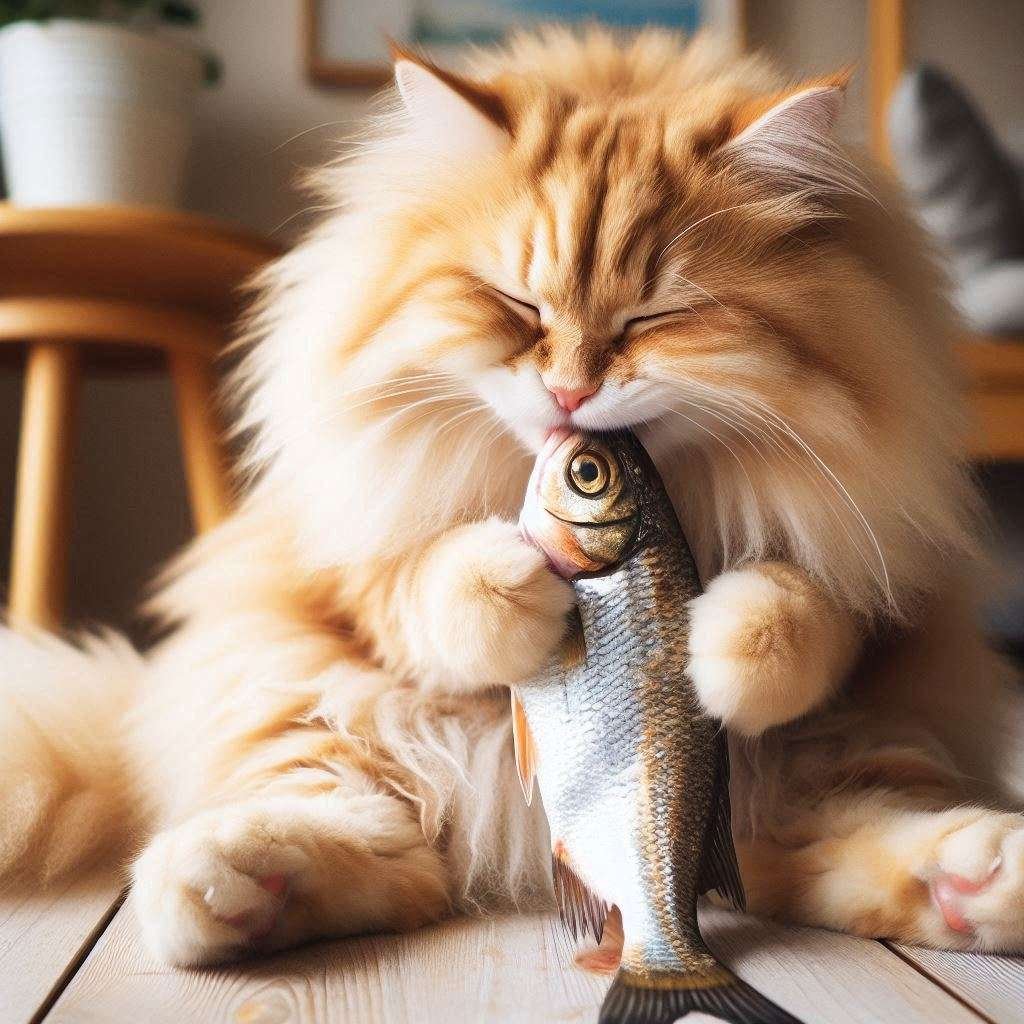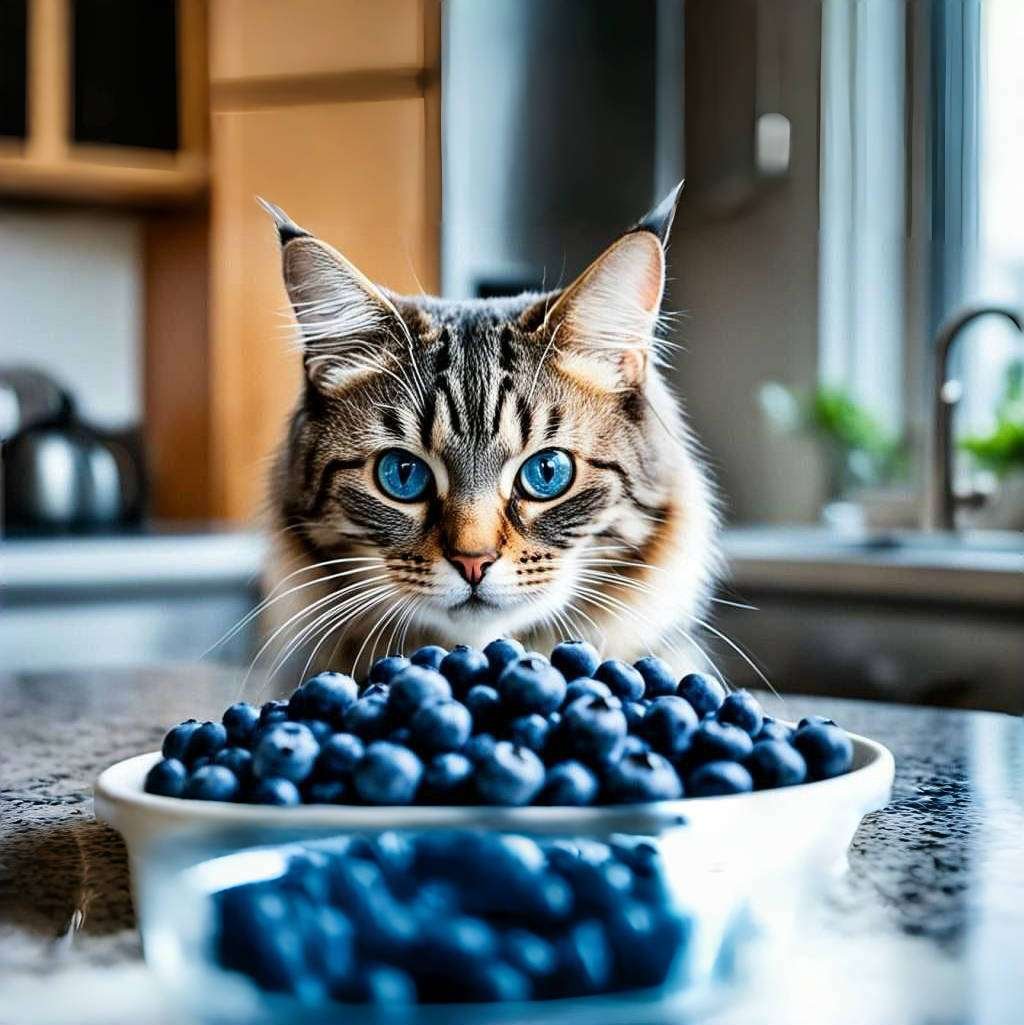Can cats have cinnamon? As pet owners, we often wonder about the safety of certain human foods for our feline friends. Cinnamon is a spice that often concerns us. Can cats safely eat cinnamon? In this guide, we’ll look into cinnamon and cats, helping pet parents make better choices for their pets.
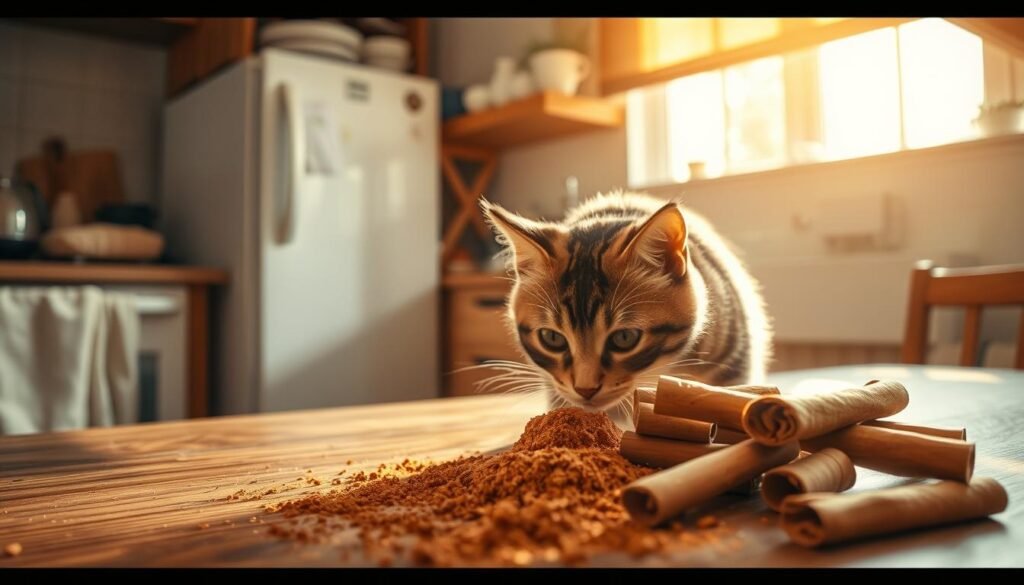
Key Takeaways
- Cats can be sensitive to cinnamon and lack the enzymes needed to digest it properly.
- Consuming large amounts of cinnamon can cause adverse effects in cats, such as vomiting or diarrhea.
- Cinnamon essential oils are extremely toxic to cats and should never be used around them.
- Safer alternatives to cinnamon, such as catnip and turmeric, can be enjoyed by cats in moderation.
- It’s best to avoid giving cinnamon to your cat, as it offers no nutritional benefits and can potentially harm their health.
Understanding Cinnamon and Cats: Basic Facts
Cinnamon comes from the bark of evergreen trees. It’s tasty for us but risky for cats. Cats need meat and can’t digest some cinnamon compounds well.
What is Cinnamon?
Cinnamon is found in powder, sticks, and oils. There are two types: Cassia and Ceylon. Cassia is common in North America and has more coumarin, which is bad for cats.
How Cats Process Spices
Cats can’t break down some spice compounds because they lack a key enzyme. This can cause problems like digestive issues and even brain damage.
Forms of Cinnamon Available
Cinnamon comes in different forms, each with its own risk for cats:
- Powdered cinnamon: Can irritate the lungs and cause stomach upset if eaten.
- Cinnamon sticks: Low risk since cats can’t easily eat them, but still not safe.
- Cinnamon essential oils: Very toxic to cats, even a little bit, because they absorb it fast.
Can Cats Have Cinnamon: Safety and Toxicity
It’s key to know about cinnamon and cats. Cinnamon isn’t toxic to cats, but too much can harm them.
Cats can’t break down cinnamon compounds well. This can cause stomach issues. Too much cinnamon can lead to diarrhea, vomiting, and even liver damage.
But, cats rarely get sick from cinnamon. Still, cat owners should watch out. Even a little cinnamon can make cats sick and need vet care.
Cinnamon essential oils are very dangerous for cats. Even a small amount can cause weakness and changes in behavior.
| Cinnamon Safety for Cats | Cinnamon Safety for Dogs |
|---|---|
| Cats lack an enzyme to properly metabolize cinnamon compounds, making them more prone to digestive issues and toxicity. | Cinnamon is generally safer for dogs compared to cats, with treats containing less than a teaspoon of cinnamon deemed safe by the Pet Poison Help Line. |
| Exposure to high concentrations of cinnamon can lead to vomiting, diarrhea, weakness, low blood sugar, and liver damage in cats. | Cinnamon essential oils are still poisonous to dogs if ingested or exposed to their skin, particularly risky for dogs with liver disease. |
| Even small amounts of cinnamon in food can make cats sick and require a vet visit. | Nutmeg, often used alongside cinnamon, contains a toxic compound called Myristicin and should be avoided in treats for dogs. |
In summary, while cinnamon isn’t toxic to cats, it’s best to keep them away from it. This includes large amounts and essential oils. Always choose cat treats and natural remedies made for their safety.
The Effects of Cinnamon on Feline Health
Cinnamon might be good for humans, but it’s not safe for cats. It has compounds like cinnamaldehyde and coumarin that can harm them.
Digestive System Impact
Cats can get sick from eating cinnamon. They might vomit or have diarrhea. Cinnamon’s oils can upset a cat’s stomach, causing discomfort and dehydration.
Respiratory Concerns
Breathing in cinnamon powder or fumes is bad for cats. They might cough, sneeze, or have trouble breathing. This is especially true for cats with breathing problems.
Skin Sensitivity Issues
Cinnamon can make cats’ skin itch or cause rashes. Cats are sensitive to cinnamon’s compounds, leading to skin problems.
Pet owners need to know the dangers of cinnamon for cats. They should keep their cats safe from cinnamon to protect their health.
“Cats have no nutritional need for cinnamon or other spices in their diet, and ingesting significant amounts can harm them.”
Different Forms of Cinnamon and Their Risks
As pet parents, it’s key to know about cinnamon’s various forms and their risks to cats. While safe for humans, cinnamon can harm our feline friends.
Cinnamon sticks might look harmless, but they’re a choking hazard. The hard sticks can easily get stuck in a cat’s throat. So, it’s best to keep them out of reach.
Ground cinnamon is also risky for cats. If they breathe it in, it can irritate their nose and lungs. This might cause coughing, sneezing, and trouble breathing.
The most dangerous is cinnamon essential oil. This strong form of cinnamon is toxic to cats. It can make them weak, change their behavior, and make them tired.
| Cinnamon Form | Potential Risks |
|---|---|
| Cinnamon Sticks | Choking hazard |
| Ground Cinnamon | Nasal and respiratory irritation |
| Cinnamon Essential Oil | Highly toxic, can cause muscle weakness, behavior changes, and lethargy |
It’s vital to keep all cinnamon forms away from cats. If you think your cat has been exposed, call your vet right away.
Cinnamon Essential Oils and Cats: A Major Concern
Cats are at risk from essential oils, including cinnamon oil. These oils are very toxic to cats because of their unique metabolism. It’s important for pet owners to know about the dangers of essential oils to keep their cats safe.
Why Essential Oils are Dangerous
Cats can’t break down toxins like essential oils because they lack a key enzyme. They are especially sensitive to phenols in these oils. The more concentrated the oil, the bigger the risk to the cat.
Signs of Essential Oil Poisoning
Exposure to essential oils can cause serious symptoms in cats. Look out for drooling, vomiting, and tremors. Cats may also show ataxia, breathing problems, slow heart rate, low body temperature, and liver failure. Strong fragrances from diffusers can also harm their breathing.
Emergency Response Steps
If you think your cat has been exposed to essential oils, act fast. Do not try to make them vomit. Call your vet right away. They might give them fluids, blood tests, pain meds, antibiotics, and stomach protectants. Quick action is key.
To keep your cat safe, avoid essential oils and diffusers. Use caution with these strong plant extracts. Never apply essential oils directly to your cat. Keep them away from any potential sources of exposure.
Safe Alternatives to Cinnamon for Cats
Cinnamon is a favorite spice for humans but can be dangerous for cats. Luckily, there are safe and natural options. These alternatives give cats the flavors and benefits they love without cinnamon’s risks.
Catnip is a great choice for cats. It helps with digestion and makes them feel calm and happy. Turmeric has anti-inflammatory properties that can help your cat’s health. Cilantro is also safe for cats and is full of minerals, though some cats might not like its taste.
- Catnip: Provides a natural high and can aid in digestion
- Turmeric: Anti-inflammatory properties in small amounts
- Cilantro: Mineral-rich but some cats may not like the flavor
When looking for cat-safe spices, natural cat treats, and feline-friendly herbs, research and talk to your vet. This ensures your cat’s safety and health. By choosing these alternatives, you can give your cat a tasty and healthy treat without cinnamon’s dangers.
“The safety and health of our pets should always be our top priority. Exploring safe alternatives to potentially harmful ingredients like cinnamon is a crucial step in responsible pet ownership.”
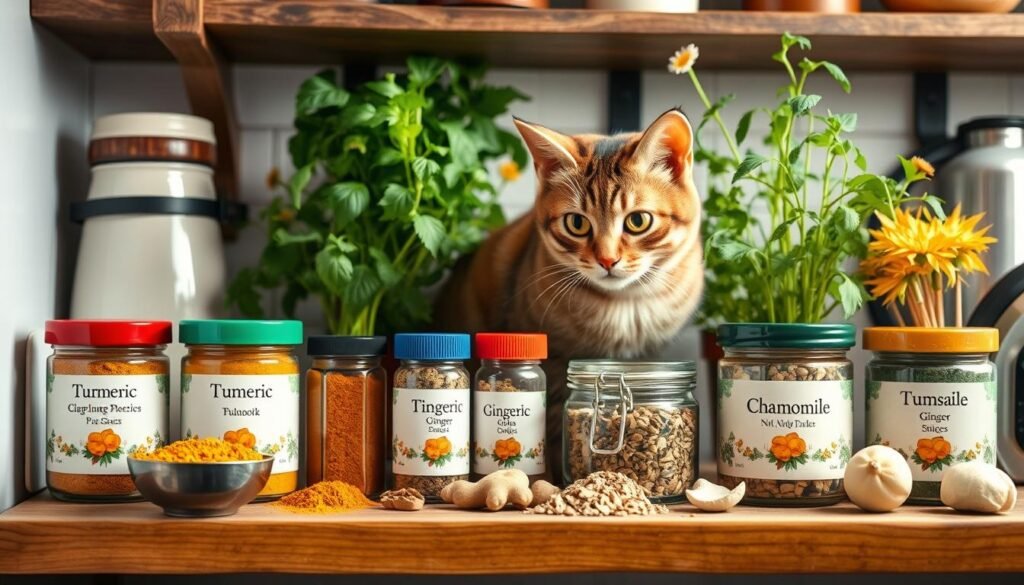
Symptoms of Cinnamon Exposure in Cats
Cats can be sensitive to spices like cinnamon because of their unique body chemistry. While cinnamon isn’t toxic to cats, it can still cause symptoms that pet owners should watch for.
Immediate Reactions
Cats may vomit, have diarrhea, or show respiratory irritation if they ingest or inhale cinnamon. These reactions come from cinnamon’s strong scent and potential irritation. Cats naturally avoid strong smells, and cinnamon’s scent is 14 times stronger for them than for humans.
Long-term Effects
Long-term exposure to cinnamon or cinnamon essential oils can be serious. Cats can’t break down cinnamon compounds properly, which may harm their livers. The coumarin in cinnamon can also cause blood clotting problems if cats eat a lot of it.
When to Contact a Vet
If your cat shows signs of cinnamon exposure, contact your vet right away. This is especially important if you think your cat has eaten cinnamon essential oils. Quick vet care is key to keeping your cat healthy.
| Symptom | Potential Cause | Recommended Action |
|---|---|---|
| Vomiting, diarrhea, respiratory irritation | Immediate reaction to cinnamon exposure | Monitor closely, contact vet if symptoms persist or worsen |
| Liver damage, blood clotting issues | Long-term exposure to cinnamon or essential oils | Seek immediate veterinary care |
| Difficulty breathing, drooling, muscle tremors, skin irritation | Exposure to cinnamon essential oils | Seek immediate veterinary care |
Knowing thecat health symptomsandfeline toxicity signsfrom cinnamon can help keep cats safe. Always talk to aveterinary careexpert if you notice any concerning signs.
Keeping Your Cat Safe Around Household Spices
Keeping your home safe for pets is very important. This includes being careful with spices and herbs. Knowing which ones are safe for cats and which ones to avoid is key. A few simple steps can help keep your cat safe and prevent accidents.
Secure spice storage is a big part of keeping your home safe for cats. Use airtight containers or cabinets that cats can’t get into. This keeps your spices fresh and stops cats from eating them. Proper spice storage is a key aspect of creating a pet-safe household.
Be careful with cinnamon-scented things because cinnamon is toxic to cats. Use essential oil diffusers, air fresheners, and baked goods with cinnamon carefully. Make sure there’s good air flow to stop cats from breathing in or eating the spice. Look for pet-safe ways to freshen the air instead.
Not all spices and herbs are safe for cats. Some, like basil and rosemary, are okay, but others, like oregano and garlic, are not. Learn which ones are safe for your cat. This will help you make better choices about what to have around your pet.
By being careful and making your home cat-proof, you can keep your pet safe and happy. Learn about the risks and benefits of different spice storage options. With a little planning, you can enjoy your favorite spices while keeping your cat safe.
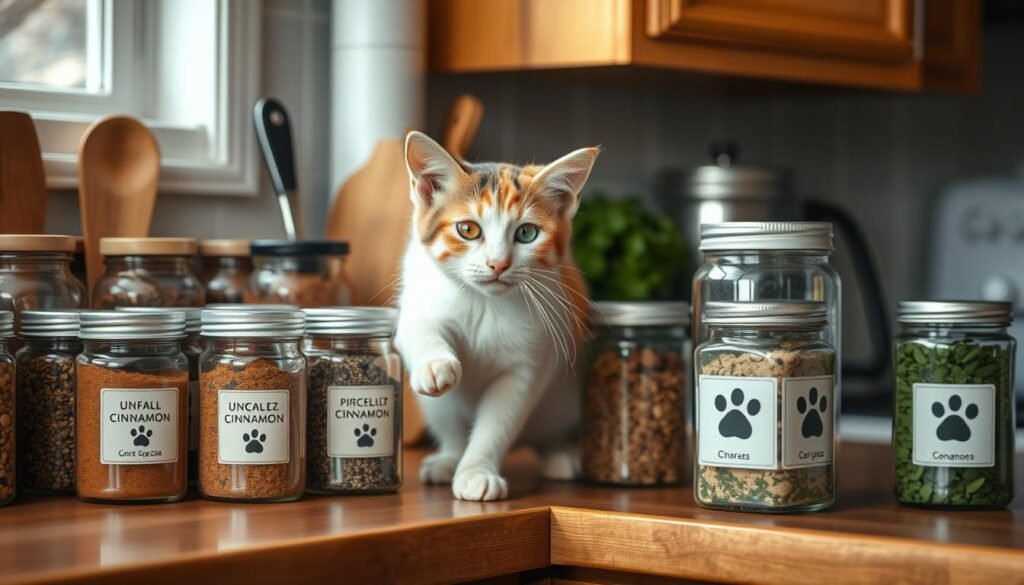
Common Household Products Containing Cinnamon
Cinnamon is a popular spice in many household items. But, it can be harmful to cats. It’s found in scented candles, air fresheners, and even baked goods.
Cinnamon can also be in unexpected items like cosmetics, toothpaste, and cleaning supplies. Even small amounts can harm cats because they can’t digest cinnamon well.
To keep your cat safe, choose pet-safe air fresheners and household fragrances without cinnamon. This way, you can enjoy a cozy home without risking your cat’s health.
It’s important to watch out for cinnamon in products. Read labels and pick cinnamon-free options. This helps keep your cat safe and happy at home.
Conclusion: Making Informed Decisions About Cinnamon and Cats
As pet owners, we must always think about our cats’ health and safety first. While cinnamon isn’t very toxic to cats, it’s still best to keep them away from it. This is especially true for the concentrated essential oil form.
Cats can’t process some compounds as well as humans do. This makes them more at risk from cinnamon and other essential oils. Since we don’t know the long-term effects, it’s safer to be careful with our cats.
Talking to your vet about your cat’s diet and using safe alternatives for smells and treats is key. This way, you can take good care of your cat and follow cat safety guidelines. Always put your cat’s health and happiness first.

